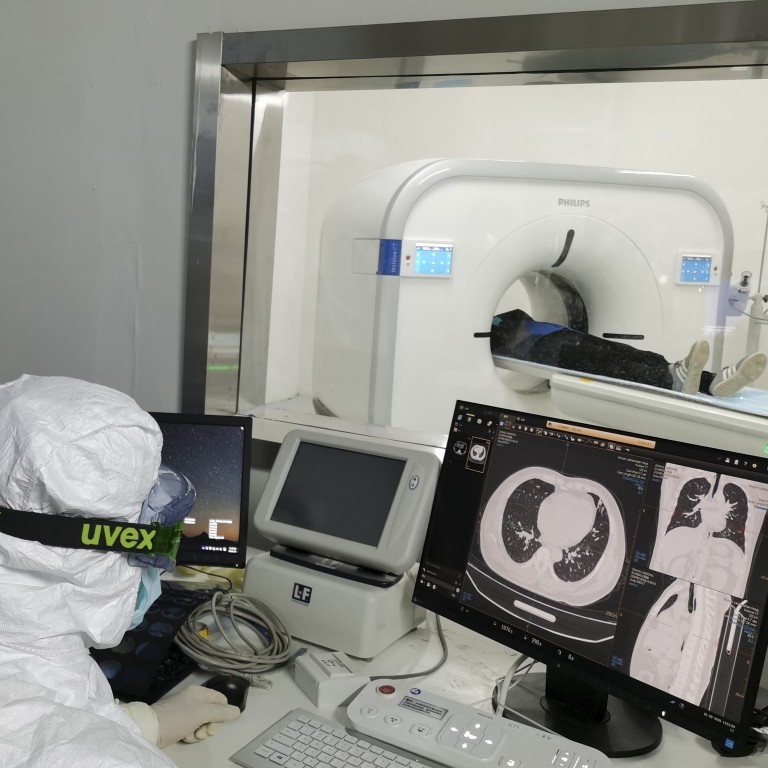
Coronavirus may lurk deep in lungs after patients recover, study suggests
- Postmortem of woman finds she had undetected traces in lungs after testing negative three times and being discharged from hospital
- As WHO investigates why some recovered patients test positive again, the medical community works to assess any lasting effect on the body
The discovery, published in a paper in peer-reviewed journal Cell Research on Tuesday, could explain why a growing number of recovered patients had tested positive again.
“Our work provided the first pathological evidence for residual virus in the lung for a patient [who tested negative] three consecutive times,” wrote the researchers, led by Dr Bian Xiuwu of the Army Medical University in Chongqing, southwest China.
There was a need for the “improvement of clinical guidelines for virus containment and disease management”, they said.
The study was based on the postmortem examination of a 78-year-old woman who died after having had the coronavirus. She was admitted to Three Gorges Central Hospital in Chongqing on January 27 after a fall. She then also tested positive for Covid-19, the disease caused by the coronavirus, and subsequently developed its symptoms.
After receiving antiviral treatment, she was deemed ready to be discharged on February 13, having returned negative results in three rounds of testing, based on samples from the back of her nose and throat.
Her condition had improved significantly, backed up by a CT scan. A day later, however, she suffered cardiac arrest and died.
The case showed “there is an urgent need to understand the pathogenesis of Sars-CoV-2 infection”, Bian and his colleagues concluded.
The medical community has yet to establish how the virus can affect the bodies of recovered patients.
The postmortem of the woman found no trace of the coronavirus in her liver, heart, intestine, skin or bone marrow.
However, the researchers found complete strains of the virus in tissue deep in her lungs. They put tissue samples under an electron microscope to confirm the existence of the intact coronavirus enveloped in a crown-like shell.
Some recovered patients may have reduced lung function, Hong Kong doctors find
The hidden strains had not been causing any obvious symptoms. The lung tissue featured the damage typically caused by a viral infection, but the absence of the virus in the rest of the body made detection difficult because the testing methods in mass use do not retrieve samples from deep in the lungs.
Bian’s team suggested flushing the lungs of patients before they are discharged from hospital, for more accurate detection of hidden strains.
Also known as bronchoalveolar lavage, this involves inserting a tube containing a washing fluid into the lungs via a patient’s mouth.
Such a diagnostic procedure is more complex, time-consuming and costly than a nose or oral swab.
“This is unrealistic,” said a doctor working in a public hospital in Beijing that treated Covid-19 patients.
“The patient will suffer too much, and there is no guarantee for 100 per cent accuracy,” said the doctor, who asked for anonymity.
China could have Covid-19 vaccine ‘ready for public use early next year’
Some positive tests came as long as 70 days after the person was first discharged, according to mainland media reports. In Japan, a cruise ship passenger over 70 years old was discharged early in March before being hospitalised again 10 days later with a fever and other symptoms, according to local health authorities.
As a growing number of people recover from infection, the phenomenon could affect disease control policies and vaccine development.
Some scientists have speculated that retesting positive could be caused by a testing flaw. Some test kits could generate false negative results with too little of the virus in the sample. Accidental contamination could also produce false positives.
A research team in China last month found that some patients, especially young people, had too few antibodies after recovery, meaning they could be infected again or unable to suppress the remaining viral strains in their body.
The estimated chance of a recovered patient testing positive again varies from one study to another.
WHO global alliance seeks billions for Covid-19 vaccine
About 14 per cent of seemingly recovered patients assessed in a study in Guangzhou in February were hospitalised again following positive test results.
Another study last month, led by professor Tong Xialin with the Beijing University of Chinese Medicine, found that the rate was nearly 16 per cent among patients taking Western medicine only, and less than 3 per cent among those taking herbal drinks at the same time.
Professor Zhong Nanshan, a leading scientific adviser to the Chinese government, said early this month that most positive test results from recovered patients could be caused by fragmented genes of the virus.
There was no direct proof that a recovered patient could infect another person, according to Zhong.
“I don’t particularly worry about this problem,” he said. “The virus was all dead, no longer infectious.”

